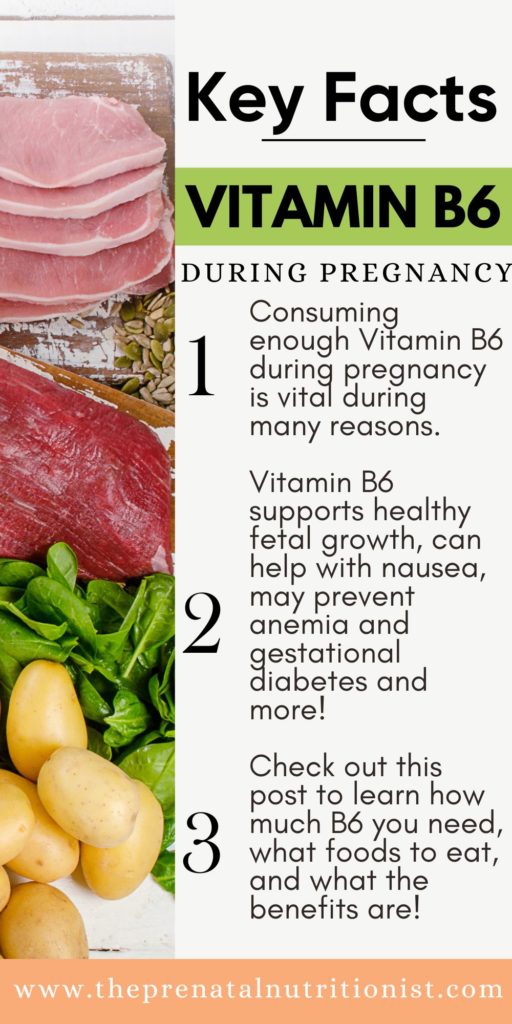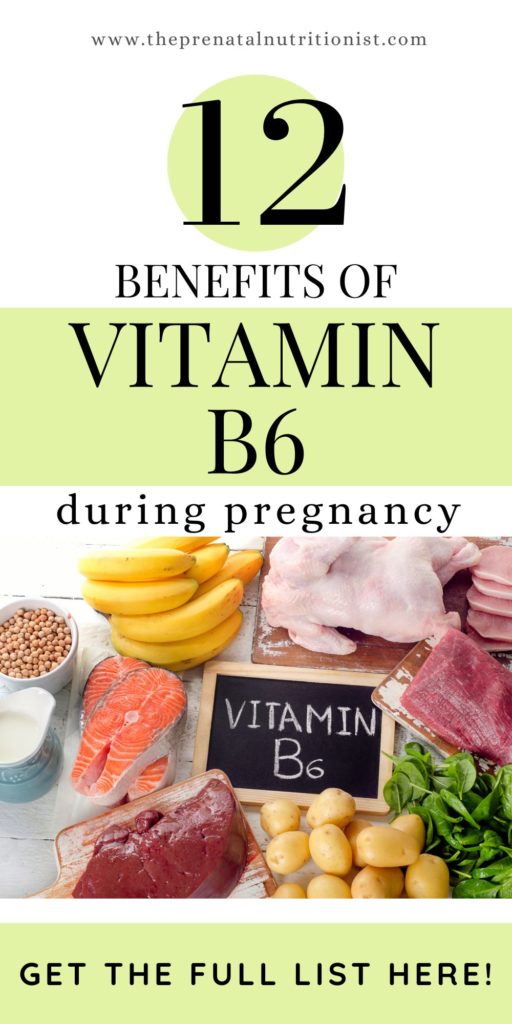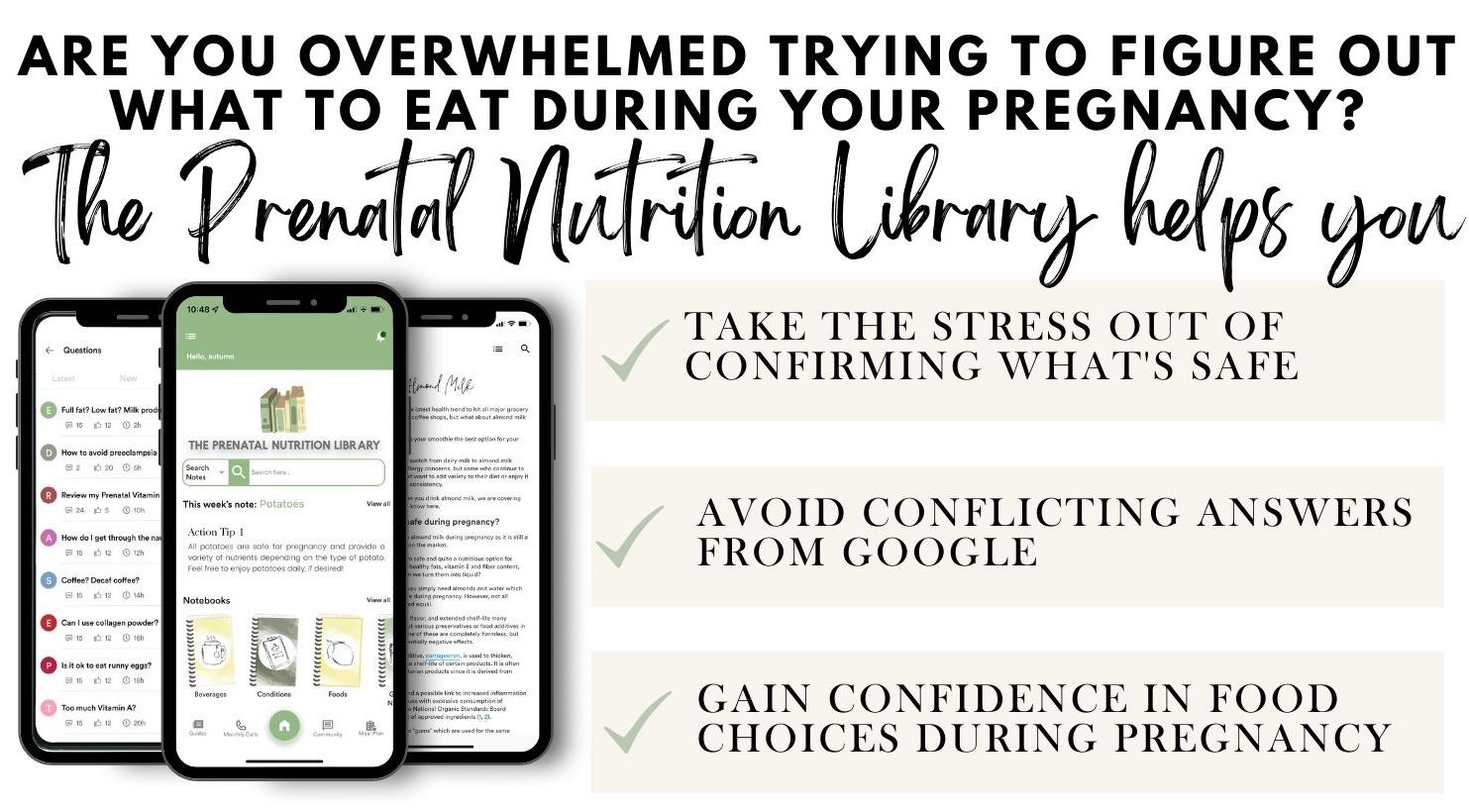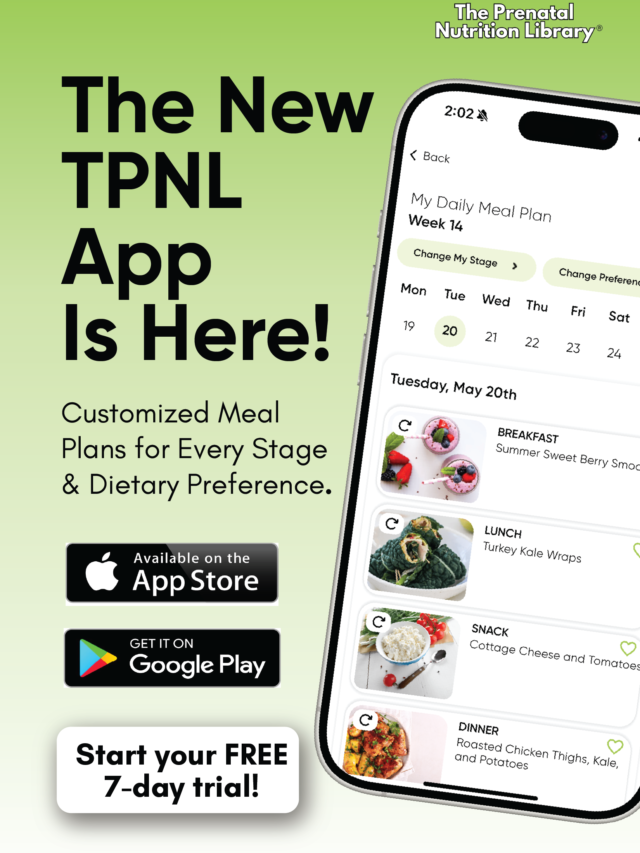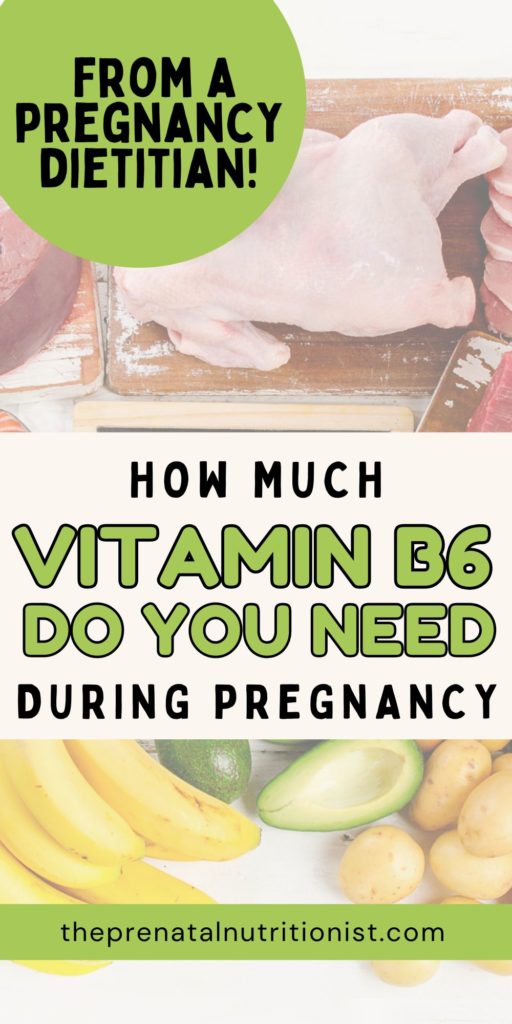
When growing a little bundle of joy, you will probably think more about your vitamin and mineral intake than ever. After all, your nutrition during pregnancy directly impacts the growth and development of your little one. There are several nutrients pregnant women need to get MORE of to support a healthy baby and mama. But hey, no pressure, right?
Navigating nutrition during pregnancy and figuring out exactly what you need, how much, and how to get it can feel overwhelming. However, rest assured that with the proper support, you can confidently ensure you and your little one get everything they need.
Vitamin D and folate tend to be superstar nutrients of focus for pregnancy (rightfully so; they are super important!). So, considering vitamin B6 needs may be a little less familiar to you. Today, we will do a deep dive into vitamin B6 and how it can help you and your developing baby during pregnancy!
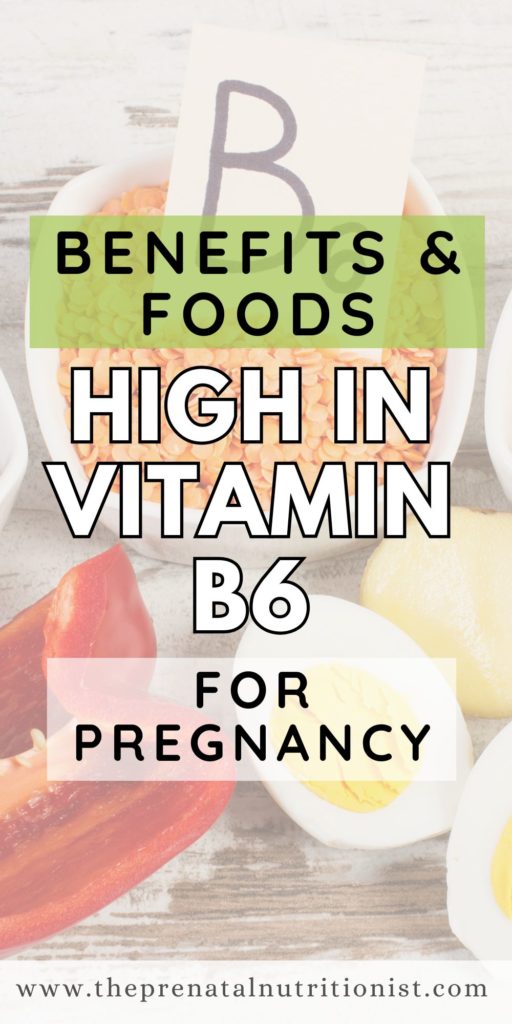
How Much Vitamin B6 Do You Need During Pregnancy?
We tend to group all the B vitamins together when in conversation, but they are not all the same, and each has its unique functions! Consuming enough vitamin B6 during pregnancy is vital for many reasons. It is needed to prevent anemia and maintain normal levels of homocysteine for the baby’s brain development and neurotransmitter formation. Vitamin B6 may also help curb nausea and morning sickness.
The Recommended Dietary Allowance (RDA) for vitamin B6 during pregnancy is 1.9 mg per day, compared to 1.3 mg per day for women outside of pregnancy. This RDA remains consistent throughout all trimesters of pregnancy. However, additional vitamin B6 may be helpful in the first trimester of pregnancy to help with nausea.
Whenever possible, it is encouraged to take a food-first approach and boost your intake of vitamin B6 through foods. Examples include bananas, chickpeas, poultry, fish, and pistachios. A high vitamin B6 smoothie incorporating spinach, bananas, and pistachios may be easier to tolerate if you’re battling morning sickness.
We know a food-first approach can be challenging during that first trimester of pregnancy. For this reason, supplementation with vitamin B6 may be appropriate to try as a tool to combat morning sickness. The recommended amount of vitamin B6 for pregnancy is around 1.9 mg per day, but large amounts—such as 25 mg—are often used under supervision to help manage nausea. However, getting too much vitamin B6 is possible, so work with your healthcare provider or dietitian on an appropriate dose of vitamin B6 that meets your needs safely.
Another thing to consider is vitamin B6 deficiency. The Centers For Disease Control (CDC) has estimated that 10% of Americans may be deficient in vitamin B6, making it one of the most common nutrient deficiencies with unwanted side effects. This is another reason to be mindful of your vitamin B6 intake and ensure you consume enough. Most prenatal vitamins will include at least some vitamin B6 to help you fill the gaps and meet your needs.
What Does Vitamin B6 Do For Pregnancy?
Supports healthy fetal development.
Vitamin B6 is crucial for the development of your fetus, particularly for the brain and nervous system. It plays an essential role in protein metabolism and synthesizing neurotransmitters, vital for brain function. Some studies suggest that adequate B6 levels during pregnancy may support your baby’s cognitive function and emotional well-being.
May reduce pregnancy-related nausea and vomiting.
Vitamin B6 is very commonly prescribed for nausea and vomiting brought on by pregnancy. Research shows that B6 supplementation reduces the severity of morning sickness. We don’t know the exact cause of morning sickness and it can happen many times a day, but there are many proposed reasons why this nutrient may help curb these symptoms. One thought is that vitamin B6 may aid in the metabolism of specific amino acids that may potentially play a role in inducing pregnancy nausea. How cool is that?
Supports immune health and function.
The immune system is slightly suppressed during pregnancy. Luckily, vitamin B6 is one nutrient that supports immune function by contributing to the production of white blood cells, which play a critical role in the body’s ability to fight infections.
Aids in the prevention of anemia.
Vitamin B6 is essential for producing hemoglobin, the protein in red blood cells that carries oxygen throughout the body. This is particularly relevant for pregnant women, who are at an increased risk of anemia due to the higher blood volume and the demands of the growing fetus.
Contributes to overall mood and well-being.
Consuming enough vitamin B6 can help stabilize mood swings during pregnancy. B6 supports producing and regulating neurotransmitters, which are key to maintaining emotional balance and well-being.
Helps manage gestational diabetes.
Seriously, what doesn’t vitamin B6 play a role in? Vitamin B6 is involved in blood sugar regulation, which is important for everyone, especially those diagnosed with gestational diabetes. Including vitamin B6-rich foods in your diet, starting at breakfast, can help support balanced blood sugar levels during pregnancy.
Promotes healthy skin and hair.
Pregnancy can lead to changes in your skin and hair. Vitamin B6 supports healthy skin by contributing to collagen production and promoting cell regeneration, which can help maintain skin and hair health during pregnancy.
Supports hormonal balance.
Vitamin B6 also plays a role in hormone balance. Hormone health and balance affect energy levels, metabolism, mood, and fertility. Vitamin B6 aids in synthesizing and metabolizing hormones, including balancing estrogen and progesterone levels.
Assists in reducing fluid retention.
Fluid retention and swelling are common during pregnancy, particularly in the legs and feet. Vitamin B6 plays a role in fluid balance and regulates sodium and potassium levels, which are keys to maintaining proper hydration and reducing swelling.
Enhances energy levels.
Fatigue is common during pregnancy, especially during the first and third trimesters of pregnancy. Vitamin B6 is essential for energy metabolism, helping your body convert food into energy. While many factors play a role, consuming plenty of B vitamin-rich foods can help support energy levels.
Supports digestive health.
Pregnancy can have a big effect on your digestive health and function. Constipation, gas, bloating, and heartburn are common complaints during pregnancy. Vitamin B6 may help improve digestive function by supporting enzyme activity and gastrointestinal motility.
Supports heart health and healthy blood pressure.
Maintaining healthy blood pressure is crucial during pregnancy to reduce the risk of complications like preeclampsia. Vitamin B6 may help regulate blood pressure by supporting cardiovascular health and well-being.
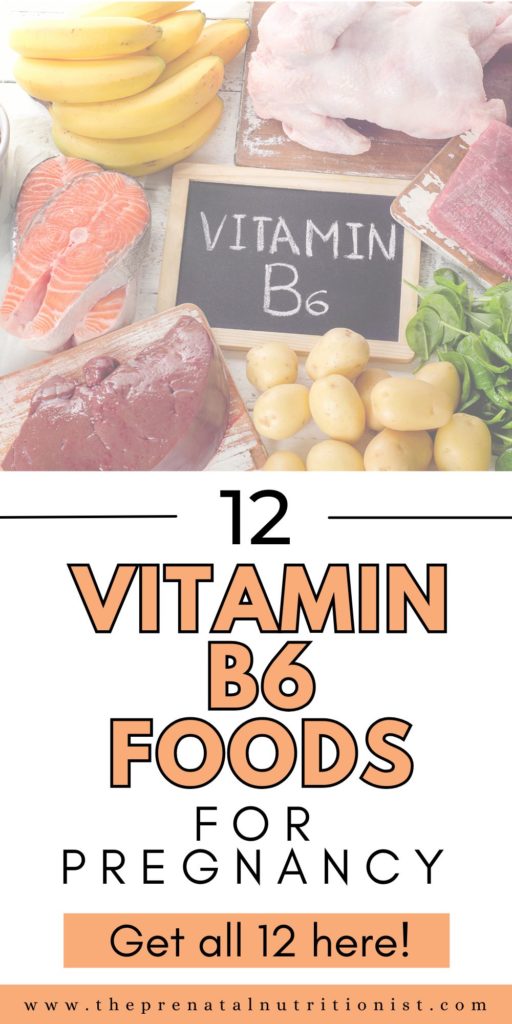
Foods High In Vitamin B6 For Pregnancy
Bananas
Bananas are a fantastic (and super convenient) source of B6. Just one medium-sized banana contains around 0.4 mg of Vitamin B6, roughly 21% of the daily recommended intake during pregnancy. They also supply about 3g of fiber per medium banana. Additionally, bananas are typically a well-tolerated food during phases of morning sickness.
Avocados
Avocados are safe and beneficial for pregnancy for many reasons! Not only are avocados a good source of B6, but they also provide healthy fats and fiber. Just like bananas, one avocado contains roughly 0.4 mg of Vitamin B6. Avocados are easy to add to a smoothie, toast, tacos, or other dishes.
Chickpeas
Chickpeas are a safe option for pregnancy. They are a good source of vitamin B6 and some plant-based protein. Just one cup of cooked chickpeas provides around 1.1 mg of Vitamin B6, over 50% of the recommended daily intake for pregnancy. Roasted chickpeas make a delicious snack for pregnancy.
Salmon
Salmon is a safe, low-mercury fish choice for pregnancy. It’s loved for its high omega-3 fatty acid content and is also a great source of vitamin B6. A 3-ounce serving of cooked salmon contains about 0.5 mg of Vitamin B6. Be sure to practice safe food handling when cooking and consuming salmon.
Poultry
A serving of cooked chicken or turkey breast contains around 0.5-0.6 mg of Vitamin B6, making it a great source of vitamin B6. When cooked thoroughly, poultry is a safe option for pregnant women. It’s important to fully cook meat and poultry and kill potentially harmful bacteria like salmonella.
Potatoes
Potatoes are yet another good source of vitamin B6 that is safe for pregnant people to enjoy. One medium baked potato provides around 0.4 mg of Vitamin B6. Baked potatoes are versatile and are another typically well-tolerated morning sickness food. They are also a great potassium source, vital for healthy blood pressure and other functions.
Spinach
Spinach is a nutritious leafy green. One cup of cooked spinach contains around 0.3 mg of Vitamin B6. It also offers a range of other vitamins and minerals, including folate, which prevents neural tube defects and anemia during pregnancy. Spinach can be eaten both raw or cooked. Of course, be sure to wash spinach thoroughly before consuming it.
Nuts
Nuts, especially pistachios, offer a safe source of B6 during pregnancy. One ounce of pistachios provides about 0.5 mg of Vitamin B6. Nuts also offer healthy fats and small amounts of protein, essential macronutrients for pregnancy. Snack on pistachios or add them to your smoothie to boost vitamin B6!
Sunflower Seeds
Sunflower seeds supply about 0.48 mg of vitamin B6 per 1/4 cup serving. They are also a good source of vitamin E, an antioxidant that plays a role in hormone health. Sunflower seeds can be sprinkled over salad, oatmeal, or added to trail mix. Additionally, sunflower seed butter can be a great swap for peanut butter when an allergy is present.
Beef Liver
Beef liver is one of the most nutrient-dense foods pregnant women can consume. It is high in many essential nutrients for pregnancy, including vitamin B6. A 3-ounce serving provides around 0.5 mg of vitamin B6. Beef liver is also a good source of iron and vitamin A. However, because it is so rich in nutrients, consuming beef liver in moderation is important. Some nutrients, like vitamin A, can be overdone. Even though this only happens when supplemented, keep beef liver intake to about 3-6 ounces per week!
Whole Grains
Whole grains such as brown rice and quinoa are good sources of vitamin B6. One cup of cooked quinoa provides approximately 0.2 mg of Vitamin B6, while a cup of cooked brown rice offers around 0.1 mg. They also provide fiber, protein, and essential minerals that support a healthy pregnancy—pair carbohydrate choices with protein and fat to support balanced blood sugar levels.
Yogurt
Yogurt is a decent source of vitamin B6. One cup of plain, whole milk yogurt contains about 0.05 mg of Vitamin B6. It also offers calcium, protein, and iodine. Some varieties also provide a boost of probiotics, which help to support gut health and digestive function. Yogurt is safe during pregnancy and can be consumed daily!
Easily meet your nutrient needs for two with The Preantal Nutrition Library (TPNL)!
I hope this article helped answer your questions about how much vitamin B6 you need during pregnancy. For more information on meeting nutrient needs for two during pregnancy, join The Prenatal Nutrition Library app! We even offer trimester-specific meal plans to help you meet your nutrient needs without feeling overwhelmed or guessing. Check out my FREE one-week meal plan to try a sample.
Come back every week for a new blog post! The Prenatal Nutritionist Blog covers all sorts of prenatal nutrition topics, including “How Much is Too Much Vitamin A while Pregnant?“ and “The Importance of Vitamin E During Pregnancy“. If you think about it, I’ve probably written about it on the blog or covered it inside our app! We can’t wait to see you inside the community!
